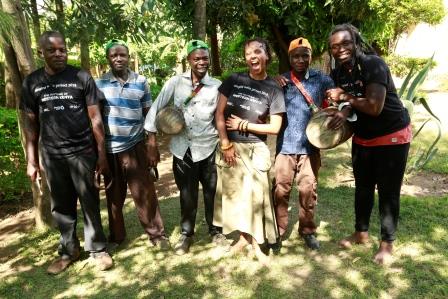Thursday, February 22, 2018
We travelled to Ilesi, Khakyega to record three groups. The first was Imachina. They call themselves after the village where they live. As with many groups over the last two days, most of their songs are for processions, like weddings, funerals, bullfights or rites of passage. So they tend to play 3-4 songs in a row to match the procession. We asked them to pick their favourite processions and then play a couple songs within these. They played:
- The Shirembe procession, which is a special funeral for a very big local hero, where you might even stage a bullfight on the grave. The songs included:
- Kutaywa: Literally means a ‘cock’ and is to let you know that this is a great man, who ‘rules the roost’ so to be speak. The singer mourns that a great man is lost and there might be no one to take care of the singer anymore.
- Mulele Kwiname: This is the name of a tree that is very popular and big and the song is about when a great beloved tree falls and dies.
- Bukundu: This is about the smell of a decaying body and the song tells people to come toward the smell and honour the man. Don’t run from this, confront it and honour his memory.
- The Mayo Procession – this is about bullfighting. The songs include:
- Lukumili: This is about the moment the horns lock between the two fighting bulls and the context really begins.
- Ing’ombe: This is about the bulls (I can’t read my handwriting here!)
- Iminyi: This is a type of bird that hides in roofs and is difficult to find, but is a strong bird. The song tells the story that the best fighting bulls are not the ones preening around the village, but rather they keep to themselves until the fight. And then they win.
- The Shiselelo procession – this is for weddings. The songs include:
- Hoya: This is encouraging the groom to forward and be welcome.
- Mbabo: This is about everyone coming together for the wedding.
- Khuchende Pole: This song is telling everyone to walk slowly to and from the wedding so all the people can gather and honour the bride and groom.
- The Shishebo process – this is about rites of passage, and specifically male circumcision. The songs include:
- Bikubanda: This is a song that mocks other tribes and peoples that don’t carry out these rituals and ‘are afraid of the knife.’
- Nuli Musata: This is a song that is encouraging the young men to be brave and go forward.
- Magic Moment: We then did a magic moment isolating the percussion.
We then recorded Shitakha and Balozi Band. The band was founded by Eric Shitakha in 2007 and is from the village of Likhovero. There are normally 8 people in the group. All songs are traditional but arranged by Eric and his partner Moses Alusa. Their style is Milbo. They use drums and shiriri, but also a Shikhorli which we haven’t seen before. This is a shaker/bell, where two ball bearings of different sizes/tones are welded into metal pouches and then he plays. Moses is considered the best Shikhorli maker in the area. Here’s the band.

Their songs included:
- Mukhana Mulabu: This is about a brown girl, that is whiter than most the girls in the village.
- Isimbiilalila: This is a bullfighting song.
- Balina Wanje Ndiranga: This is a song about being tired and in a bad state.
- Mama Mulai:
- Rosie: This is praising a lady named Rosie.
- Influences: Fadhilee than joined them for another round of Rosie with Fadhilee on guitar.
We then recorded the final group Marhanda Youth Generation. They were a classic processional band – wild and crazy. Therefore, we had lots of songs, but we couldn’t really separate fully all they played. But roughly, we recorded:
- Mayo Procession:
- Mama ing’ombe
- Ndula Mumbu
- Mukamulala Shimbuyata
- Church Songs
- Mungu Wangu
- Lichena Lili Mukono
- Several songs from the Shirembe tradition, which is the special funeral for town hero.
Then we had a magic moment where they actually did a procession through the village.
Finally, and this was during one of the breaks, we recorded interviews with our Influences artists and he also recorded three acoustic songs; these were:
- Mama: This is a song about what you do when your mother is no longer around to watch you and control your behaviour. Who are you as a man, when ‘no one is watching.’ He wrote this in March 2017 and it will be on his new album.
- Shombu: This is a girl’s name and is a traditional song. But he takes it and says, “Yes, you are a beautiful girl, but let me warn you. Many will try to be with you and there is a danger if you are not careful you could catch HIV. Your beauty could be a curse if you are not cautious.” He wrote this in 2010.
- Umbeba. This means, you are carrying something and is an exaltation about holding on to what is yours and being proud of what you carry. He wrote this in 2009 and this is the first time it has been recorded
- Wongo: This is a song he played earlier on the trip and we wanted to hear him do it.
With that, we concluded our trip and returned to Kisumu for flights to Nairobi.
